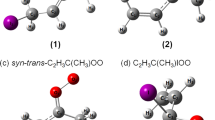Abstract
THE primary act in the photolysis of acetone at room temperature has been shown by a number of workers to be the production of an acetyl and a methyl radical1. It is believed that the photolysis of hexafluoroacetone is a simpler process in which only trifluoromethyl radicals and carbon monoxide are formed2. Hexafluoroacetone is thus an unambiguous photochemical source of trifluoromethyl radicals, and the close structural similarity of 1 : 3-dichlorotetra-fluoroacetone has prompted an investigation into its suitability as a source of difluorochloromethyl radicals.
This is a preview of subscription content, access via your institution
Access options
Subscribe to this journal
Receive 51 print issues and online access
$199.00 per year
only $3.90 per issue
Buy this article
- Purchase on Springer Link
- Instant access to full article PDF
Prices may be subject to local taxes which are calculated during checkout
Similar content being viewed by others
References
Davis, W., Chem. Revs., 40, 201 (1947).
Ayscough, P. B., and Steacie, E. W. R., Proc. Roy. Soc., A, 234, 476 (1956).
Trotman-Dickinson, A. F., Ann. Rep. Chem. Soc., 55, 39 (1959).
Author information
Authors and Affiliations
Rights and permissions
About this article
Cite this article
BOWLES, R., DERBYSHIRE, H., MAJER, J. et al. Photolysis of 1 : 3-Dichlorotetrafluoroacetone. Nature 185, 683–684 (1960). https://doi.org/10.1038/185683b0
Issue Date:
DOI: https://doi.org/10.1038/185683b0
This article is cited by
Comments
By submitting a comment you agree to abide by our Terms and Community Guidelines. If you find something abusive or that does not comply with our terms or guidelines please flag it as inappropriate.



